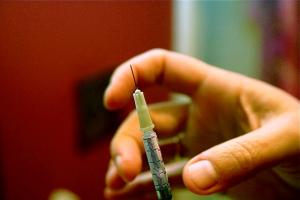SCIENCE NEWS by Ashley Yaeger Feb. 14, 2015
SAN JOSE, Calif. — Genetic data are beginning to reveal how the Ebola virus causing the epidemic in Western Africa is evolving.
 LITTLE TWEAKS A detailed look at genomes of the Ebola virus has pinpointed mutations that may make one type of experimental therapy less effective. Cynthia Goldsmith/CDC
LITTLE TWEAKS A detailed look at genomes of the Ebola virus has pinpointed mutations that may make one type of experimental therapy less effective. Cynthia Goldsmith/CDC
Scientists have deciphered the entire catalog of genetic data for 96 Ebola viruses taken from patients infected in 2014 during the first four months of the outbreak.
The results show that one particular clade, or type of the virus, is dominant among patients in Sierra Leone, suggesting that two other clades that dominated early on in the outbreak have died out.
This third clade appears to have evolved starting with a single mutation in the genetic catalog, or genome, of the virus, said Stephen Gire of Harvard University and the Broad Institute in Cambridge, Mass. He presented the preliminary findings February 14 at the annual meeting of the American Association for the Advancement of Science.
Read full article.



 Novavax's product is a glycoprotein recombinant nanoparticle vaccine adjuvanted with Matrix M (Ebola GP) to boost immune response. Conducted in Australia, the study will test the safety and immunogenicity of the vaccine, with and without the adjuvant, in 230 healthy adults ages 18 to 50. Subjects will be given two intramuscular injections 3 weeks apart....
Novavax's product is a glycoprotein recombinant nanoparticle vaccine adjuvanted with Matrix M (Ebola GP) to boost immune response. Conducted in Australia, the study will test the safety and immunogenicity of the vaccine, with and without the adjuvant, in 230 healthy adults ages 18 to 50. Subjects will be given two intramuscular injections 3 weeks apart.... LITTLE TWEAKS A detailed look at genomes of the Ebola virus has pinpointed mutations that may make one type of experimental therapy less effective. Cynthia Goldsmith/CDC
LITTLE TWEAKS A detailed look at genomes of the Ebola virus has pinpointed mutations that may make one type of experimental therapy less effective. Cynthia Goldsmith/CDC



Recent Comments